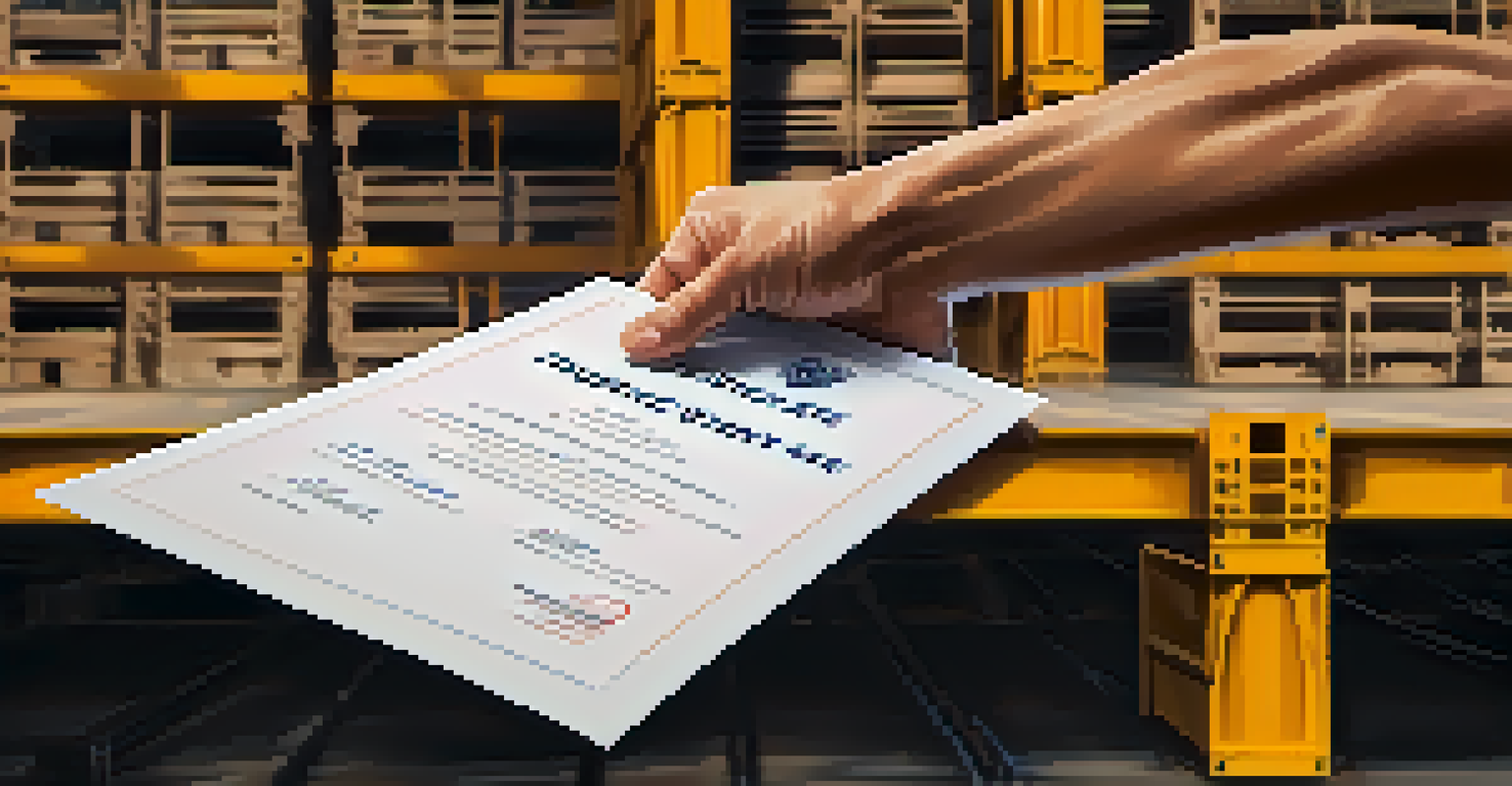Export Documentation: Key Papers for International Sales

Understanding Export Documentation and Its Importance
Export documentation is a vital part of international trade that ensures smooth transactions between sellers and buyers across borders. Without proper documentation, shipments may be delayed, or worse, sent back, leading to lost revenue and strained relationships. Think of export documents as your ticket to a global market, ensuring that everything is in order for a successful sale.
Documentation is a key component in the success of international trade, ensuring that goods are shipped legally and efficiently.
Each document serves a specific purpose, from confirming the sale to ensuring compliance with international laws. Understanding these documents not only protects your business but also offers clarity to your international partners. This knowledge can be the difference between a successful export operation and a logistical nightmare.
Additionally, having the right export documentation can enhance your credibility as an exporter. It shows that you are professional and organized, making it easier for potential clients to trust you. When you present well-prepared documents, you're setting the stage for a long-term business relationship.
Commercial Invoice: The Backbone of Export Transactions
The commercial invoice is one of the most essential export documents. It details the sale transaction, including the product description, price, quantity, and payment terms. Think of it as the invoice you receive after dining at a restaurant—without it, the restaurant can't prove the meal was ordered and consumed.

This document is crucial for customs clearance, as it provides authorities with the necessary information to assess duties and taxes. A well-prepared commercial invoice can facilitate a smoother customs process, preventing unexpected delays. Remember, accuracy is key; any discrepancies can lead to unnecessary complications.
Key Export Documents Explained
Understanding essential export documents like the commercial invoice and packing list ensures smooth international transactions.
Moreover, the commercial invoice serves as a legal document that can be referenced in case of disputes regarding the transaction. It’s wise to keep a copy for your records as well. By being diligent with this document, you can safeguard your business interests and maintain clear communication with your buyer.
Packing List: A Detailed Roadmap of Your Shipment
The packing list complements the commercial invoice by providing a detailed breakdown of the items being shipped. It includes information such as weights, dimensions, and packaging types, functioning like a recipe that outlines all the ingredients in a dish. This ensures that everyone involved knows exactly what to expect.
The right paperwork can make or break your export business; it’s the foundation upon which your international transactions are built.
Customs officials often require a packing list to confirm that the shipment matches the commercial invoice. A well-organized packing list can expedite customs inspections and minimize the risk of delays. It's not just about listing items but presenting them clearly to avoid confusion.
Additionally, the packing list is helpful for your logistics team to ensure that all items are accounted for before shipment. This attention to detail can prevent costly errors, such as missing items or incorrect shipments. In essence, the packing list acts as a roadmap, guiding your shipment through the maze of international logistics.
Bill of Lading: Your Shipment’s Travel Companion
The bill of lading (BOL) is a critical document issued by a carrier that serves multiple purposes. It acts as a receipt for the goods shipped, a contract for transportation, and a document of title. Picture it as a boarding pass for your cargo, giving it permission to travel across borders.
The BOL outlines the terms and conditions of the shipment, including the responsibilities of the carrier and the shipper. If something goes wrong during transit, this document becomes vital for claims and disputes. It’s essential to ensure that all information on the BOL is accurate and matches other documents to avoid complications.
Importance of Compliance
Proper export documentation helps businesses comply with international laws, avoiding costly delays and legal issues.
Furthermore, the bill of lading is often required by banks if you’re financing the shipment. Having this document in order can facilitate smoother transactions and help maintain your cash flow. Overall, the BOL is indispensable in the logistics of international trade, keeping things moving efficiently.
Certificate of Origin: Proving Your Product’s Roots
A certificate of origin is a document that verifies the country where the goods were manufactured. This certificate is often required by customs authorities in the importing country to determine tariffs and trade agreements. Think of it as a birth certificate for your product, establishing its origin and authenticity.
Having a certificate of origin can also provide benefits such as reduced tariffs under certain trade agreements. This can lead to significant cost savings, making your products more competitive in international markets. It’s an excellent incentive to ensure you have this document prepared and included with your shipment.
Moreover, different countries have varying requirements for the certificate of origin, so it’s crucial to familiarize yourself with these regulations beforehand. By ensuring compliance, you can avoid potential delays and penalties at customs. Overall, this document plays a pivotal role in facilitating smooth international trade.
Export License: Navigating Legal Requirements
An export license is a government-issued document that allows the export of specific goods to certain countries. Not all products require an export license, but it’s crucial to check if yours does. Think of it as a permission slip, ensuring that your goods can legally leave the country and enter the desired market.
Export licenses are often required for sensitive or controlled items, such as military goods or products that could impact national security. Failing to obtain the necessary license can lead to severe penalties, including fines or loss of export privileges. Therefore, staying informed about the licensing requirements for your products is essential.
Protecting Your Shipment
Documents like the insurance certificate safeguard your financial interests, providing peace of mind during transit.
Furthermore, the process of obtaining an export license can vary in complexity and duration. It’s wise to start this process early in your export journey to avoid last-minute complications. By understanding and adhering to export licensing requirements, you can ensure compliance and protect your business.
Insurance Certificate: Safeguarding Your Shipment
An insurance certificate is a document that provides proof of insurance coverage for your shipment. This document is crucial for protecting your financial interests in case of loss or damage during transit. Consider it a safety net for your cargo, offering peace of mind while it travels the world.
Having an insurance certificate can also reassure your buyers, showing that you’re taking steps to mitigate risks associated with international shipping. If something goes awry, this document will be vital for filing claims and recovering losses. Without it, you might find yourself in a difficult situation with little recourse.

Moreover, different shipping methods and routes may require varying levels of insurance coverage. It’s important to assess your shipment’s value and choose an appropriate insurance policy. By being proactive about shipment insurance, you’re investing in the security of your business and your products.
Final Thoughts on Export Documentation Best Practices
Navigating the world of export documentation can seem daunting, but understanding these key papers is crucial for success in international sales. Each document plays a unique role in ensuring that your goods reach their destination smoothly and legally. By being well-versed in the required paperwork, you can streamline your export processes.
Regularly reviewing and updating your documentation practices can also prevent potential pitfalls. Staying informed about changes in regulations or requirements is essential for maintaining compliance and protecting your business interests. Treat your export documentation like a living document—one that evolves with your business.
Lastly, don’t hesitate to seek expert advice if you’re unsure about any aspect of export documentation. Building relationships with customs brokers or logistics professionals can provide invaluable insights and support. With the right preparation and knowledge, you can confidently embark on your export journey.